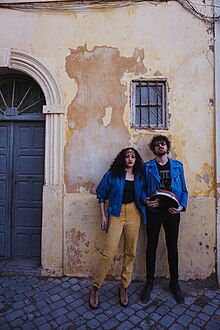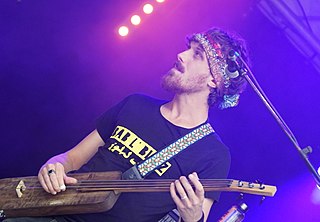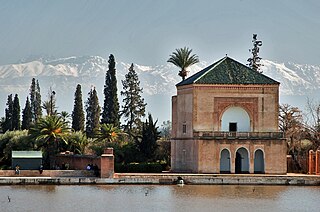
Marrakesh or Marrakech is the fourth-largest city in Morocco. It is one of the four imperial cities of Morocco and is the capital of the Marrakesh–Safi region. The city lies west of the foothills of the Atlas Mountains.
Moroccan music varies greatly between geographic regions and social groups. It is influenced by musical styles including Arab, Berber, Andalusi, Mediterranean, Saharan, West African, and others.
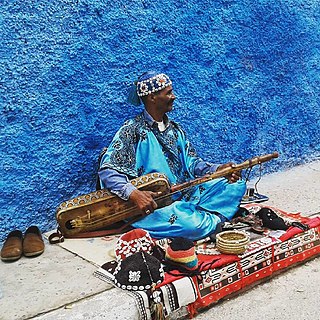
The Gnawa are an ethnic group inhabiting Morocco, that had been brought as slaves from the West African Sahel.
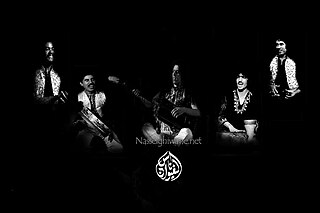
Nass El Ghiwane are a musical group established in 1970 in Casablanca, Morocco. The group, which originated in avant-garde political theater, has played an influential role in Moroccan chaabi.
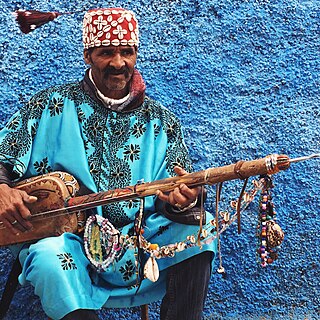
Gnawa music is a body of Moroccan religious songs and rhythms. Emerging in the 16th and 17th centuries, Gnawa music developed through the cultural fusion of West Africans brought to Morocco, notably the Hausa, Fulani, and Bambara peoples, whose presence and heritage are reflected in the songs and rituals. Its well-preserved heritage combines ritual poetry with traditional music and dancing. The music is performed at lila, communal nights of celebration dedicated to prayer and healing guided by the Gnawa maalem, or master musician, and their group of musicians and dancers. Though many of the influences that formed this music can be traced to West African kingdoms, its traditional practice is concentrated in Morocco. Gnawa music has spread to many other countries in Africa and Europe, such as France.
Gnawa Diffusion is an Algerian Gnawa music band based in Grenoble, France. The group's lead singer, Amazigh, is the son of the Algerian writer and poet Kateb Yacine. Although there is a strong Gnawa influence, the band is noted for its mix of reggae and roots music. Gnawa Diffusion is very popular in Algeria and is also well known in many other countries including Morocco, Tunisia and France. The band's lyrics are in Algerian Arabic, Tamazight, French and English. Gnawa Diffusion started their career in 1993 with the release of the album Légitime différence.

Hoba Hoba Spirit is a musical fusion band based in Casablanca, Morocco. The band was formed in 1998. It is composed of Adil Hanine (drummer), Anouar Zehouani (guitarist), Saâd Bouidi, Reda Allali -, Othmane Hmimar(percussionist) and the newly added member Philippe Laffont. The name of the group is based on a song by Bob Marley.

Bab Agnaou, also transliterated as Bab Agnaw, is one of the best-known gates of Marrakesh, Morocco. Its construction is attributed to the Almohad caliph Abu Yusuf Ya'qub al-Mansur and was completed around 1188 or 1190.

Ahmed Soultan is a Moroccan singer artist, considered one of the leaders of the "Nayda".
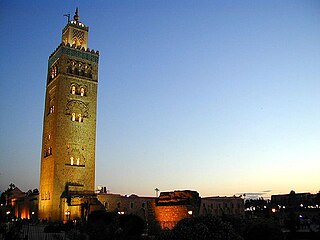
This article describes notable landmarks, architecture, and museums in the city of Marrakesh, Morocco.

Tishoumaren or assouf, internationally known as desert blues, is a style of music from the Sahara region of northern and west Africa. Critics describe the music as a fusion of blues and rock music with Tuareg, Malian or North African music. Various other terms are used to describe it including desert rock, Saharan rock, Takamba, Mali blues, Tuareg rock or simply "guitar music". The style has been pioneered by Tuareg musicians in the Sahara region, particularly in Mali, Niger, Libya, Algeria, Burkina Faso and others; with it also being developed by Sahrawi artists in Western Sahara.
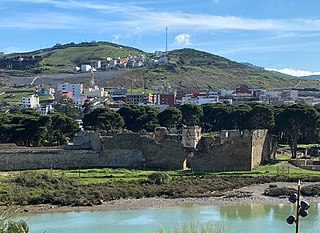
Ksar es-Seghir, also known by numerous other spellings and names, is a small town on the Mediterranean coast in the Jebala region of northwest Morocco, between Tangier and Ceuta, on the right bank of the river of the same name. Administratively, it belongs to Fahs-Anjra Province and the region of Tanger-Tetouan-Al Hoceima. By the census of 2004, it had a population of 10,995 inhabitants.
Chaabi, also known as Chaâbi, Sha-bii, or Sha'bii meaning "folk", refers to different music genres in North Africa such as Algerian chaabi, Moroccan chaabi and Egyptian Shaabi.
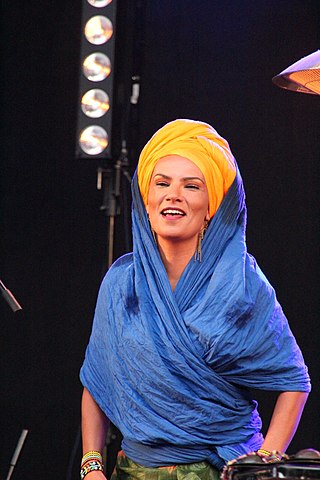
Oum El Ghaït Benessahraoui, better known as Oum, is a singer-songwriter of modern Moroccan popular music. Performing and recording both in North Africa and in Europe, she mixes hassani, jazz, gospel, soul, afrobeat and Sufi musical influences in her songs.
Mohamed Abdennour is an Algerian composer, arranger and instrumentalist, active in France and playing a fusion of different musical forms mixed with chaabi.
3MA is a contemporary African music group, consisting of three players of different string instruments: Ballaké Sissoko from Mali on kora, Driss El Maloumi from Morocco on oud and Rajery from Madagascar on valiha. The band takes its name from the first two letters of each member's country of origin in French: Madagascar, Mali, and Maroc.
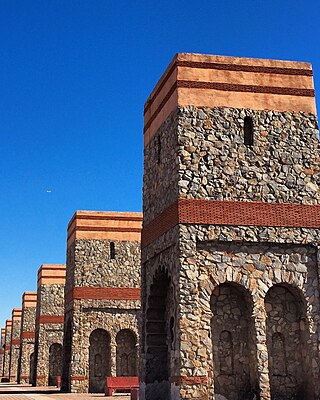
The Seven Saints of Marrakesh or Patron Saints of Marrakesh are seven historical Muslim figures buried in Marrakesh, Morocco. Each of them was a famous Muslim jurisprudent, scholar or wali venerated for their piety or other mystical attributes. Their tombs form the basis of a centuries-old annual pilgrimage or ziyara, during which visitors pray at each of their tombs over seven days.

Driss El Maloumi is a Moroccan composer and performer on the oud, the Arabic short-necked lute. He is mainly known for playing solo or in trio formations under his own name, for his long-standing cooperation with Catalan musician and musical director Jordi Savall, as well as for being a member of the group 3MA, comprising three popular African string instrumentalists.

Majid Bekkas, also known as Abdelmajid Bekkas, is a Moroccan musician on guembri, oud, guitar and vocals, who is internationally known for his contributions to World music and Ethno jazz with North African roots.
